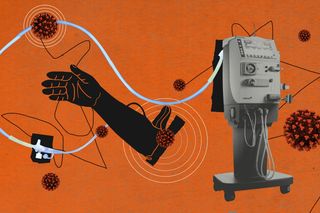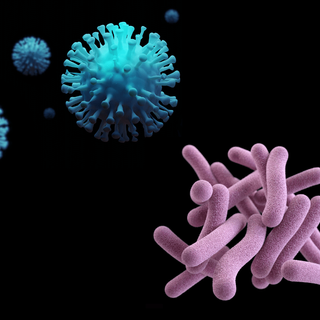
People With Chronic Illnesses Are Struggling To Access Treatment Due to the Pandemic
“If I go to the hospital, I might die. If I don’t, I’ll die at home. It’s the same thing,” said a cancer patient.

S.K., a 29-year-old Mumbai-based businessman, suffers from chronic kidney disease. The condition requires him to undergo dialysis, a procedure to remove excess water and toxins from his blood, as his damaged kidneys cannot. Not only does this require him to visit a hospital twice a week, like most dialysis patients, but it also means that his immune system is compromised and is more prone to infections, including Covid19.
“Going to a hospital is scary because you know you are walking straight into a hotspot,” says S.K. “Since the hospital I visit has Covid19 patients, I tried to set up home dialysis but, unfortunately, it hasn’t worked out because certain parts of the machine have apparently not been available and not a lot of people are willing to set it up owing to the current environment,” he added.
That’s not the only problem patients like S.K. are facing. Hospital out-patient departments (OPDs) began reducing their daily operations at least a week before the nationwide lockdown was announced on March 24, offering only emergency services and surgeries. To make things worse, in some states such as Chhattisgarh, Rajasthan, and Madhya Pradesh, governments took over private hospitals appointing them as Covid19 hospitals leaving patients with chronic illnesses with few or no options to undergo treatments.
Currently, more than 1.5 million people in India are suffering from chronic kidney disease and, each year, at least 200,000 get added to this number, Hindustan Times reported. Patients, caregivers, and doctors are currently worried that the nation’s focus on one public health crisis means that patients needing regular treatments will be ignored.
According to reports, many hospitals with in-house dialysis units have either shut down or asked operators to move out. “Many of the dialysis units in hospitals are suddenly being asked to stop and shift elsewhere. This includes hospitals in Andhra Pradesh, Odisha, Gujarat and some other states. Moving the set up cannot be done overnight, as the creation of necessary facilities, including for treatment of the water used for dialysis, takes time and operating a dialysis machine requires a specialized skillset,” said professor Vivekananda Jha, The George Institute for Global Health, to The Week.
Related on The Swaddle:
How Doctors Are the Unwitting, Frustrated Soldiers in the War Against Covid19
“It’s not easy to keep dialysis units functioning normally because not only are the patients vulnerable, but the staff is, too. With adequate PPE not available, it means we’re putting the staff’s lives at risk,” said Dr. G.S., a senior consultant of renal transplant at a Mumbai-based private hospital.
At present, if a hospital detects even a single positive Covid19 case, it shuts down the entire dialysis unit for disinfection, and quarantines the staff. However, there is always the risk of asymptomatic dialysis patients, which worries the hospitals.
“It’s impossible to test all patients coming in for dialysis,” added Dr. G.S. “Every time a dialysis patient coughs, it’s scary to think that they may turn out to be Covid19 positive because multiple hospital visits a week means they’re at a very high risk of catching the infection,” she added.
With the lockdown, the government intends to contain the spread of Covid19, but its abrupt nature has jeopardized the lives of those requiring dialysis in two ways. First, it has led to a disruption in the supply chain of essential goods and services, leading to a shortage of medicines, dialyzers, IV needles, and anticoagulants or drug thinners, which are required for dialysis. Second, hospitals and dialysis units are facing a staff crunch due to transportation problems. In many cases, even patients are finding it difficult to reach on time for their treatments, especially in tier-II and tier-III cities.
Take Indrani Dasgupta’s case for instance. The 58-year-old homemaker from Allahabad, who doesn’t own a vehicle, was refused by rickshaws and could not book any cabs. “We weren’t asking neighbors initially because we didn’t want to put their lives at risk. I got delayed in my treatment by three days, my face was swollen, my BP was high, and that’s when my son decided to borrow a friend’s car and rushed me to the hospital. On my arrival, the doctors said if I had delayed it even by a few hours, I could have died,” she recounted.
Like dialysis patients, the ill-planned distancing measures have left another group at risk and susceptible to Covid19 — those undergoing chemotherapy.
Related on The Swaddle:
Pneumonia Caused by Coronavirus Is Likely to Be More Severe Than Other Types of Pneumonia
According to the World Health Organization, cancer patients are twice as susceptible to contracting Covid19 as compared to the general population. In India, cancer accounts for 10% of all registered deaths every year and is the second most common disease, The Wire reported. Yet, the government hasn’t issued any guidelines for cancer care in the current scenario. Cancer patients are therefore at risk of not being able to regularly receive essential treatments, such as radiotherapy and chemotherapy. This is not only because, as mentioned above, hospitals have cut down on OPD services, but also because follow-up patients have been asked to stay at home in some cases.
“There are chances of progression of the disease in case there is a delay in the treatment,” says Delhi-based Harshita Yadav, a 33-year-old graphic designer who suffers from bladder cancer. “Another problem is that once a patient begins a session in a certain hospital, it is difficult to shift to another one,” she added. Yadav postponed two chemotherapy cycles on the advice of her doctor because the four cycles administered to her previously have left her extremely weak and visiting the hospital in this state is not advisable. “As of now, the doctor has asked me to come only if there’s an emergency or consult the department on the phone or video conference,” she adds.
Inaccessibility to treatments is not the only trouble patients are facing. Physical distancing to ensure their safety and their family’s means an increase in the loneliness they are experiencing in a crisis. “It’s a very stressful time for me, I don’t know if I’m going to survive. If I go to the hospital, I’ll die. If I don’t, I might die at home. It’s the same thing,” said Yadav.
While S.K. and Yadav struggle to receive treatment for their physical health problems, for another group of people, these times have exacerbated their mental health issues.
A.P., a 30-year-old journalist undergoing treatment for General Anxiety Disorder at Mumbai’s Sion Hospital, said that the OPD at the hospital is no longer functioning. “My treatment is paused. I am on a prescription but need a proper check-up. I am unable to find one of the key medicines being used for my treatment,” she said. “I haven’t started looking for alternatives with the hope that the state would open OPDs at government hospitals, at least for short durations, during the day. I hope the OPD starts from April 20,” she added when she spoke to The Swaddle.
On April 21, one week after the lockdown extension, Maharashtra’s state government suggested that private hospitals open their OPDs to treat all patients. However, private hospitals don’t seem keen on this, stating that they don’t have enough staff and risk a shutdown if a patient tests positive, according to Indian Express. This conflicts with the Centre’s directive, issued on April 10, stating,”States need to be mindful that the treatment or medical needs of pregnant women, dialysis patients and those suffering from ailments such as Thalassemia are attended to.”
With little hope that something will be done to aid them, for now, patients like S.K. only ask for little. “The government could have at least imposed stricter screening processes at hospitals before people enter because you don’t know who could be a carrier. I see not everyone is wearing a mask either,” S.K. says. “For now, I can only hope that the mask and gloves I wear outside are enough to protect me.”
Anubhuti Matta is an associate editor with The Swaddle. When not at work, she's busy pursuing kathak, reading books on and by women in the Middle East or making dresses out of Indian prints.
Related


Despite Criticism, Ayush Ministry Plans to Begin Clinical Trials of Ayurvedic Herbs
